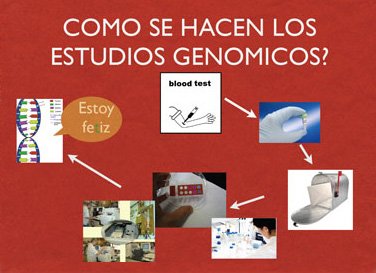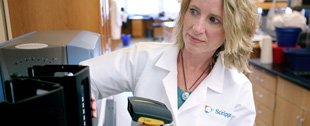Home » Translational Research » Research Highlights » Diabetes » Here
In this section
Scripps-San Diego Diabetes Genebank
 This image is part of a presentation to inform and educate individuals of Mexican ancestry about genomics.
This image is part of a presentation to inform and educate individuals of Mexican ancestry about genomics.
A team of Scripps Translational Science Institute (STSI) and Scripps Whittier Diabetes Institute (SWDI) scientists and physicians are establishing a genebank to enable researchers to pinpoint the DNA variations that predispose individuals with Mexican ancestry to diabetes and its complications. Genetic variants also may influence their response to diabetes therapies.
Although they have a higher lifetime risk for diabetes than do African-Americans and non-Hispanic Caucasians, people with Mexican and other Hispanic ancestry have not yet been adequately represented in genomic studies.
Thus, the Scripps San Diego Diabetes Genebank will be a much needed resource for expediting investigations about the physiopathology of diabetes and disorders of glucose metabolism, diabetes risk classification, pharmacogenomics, personal risk for diabetes complications, and variations in genetic risk by ancestry.
Such a resource also will help scientists to identify the genetic signatures of patients who are pre-diabetic but at high risk for developing the disease; unravel gene-environmental interactions in diabetes; and design prevention strategies in the community.
The Scripps Whittier Diabetes Institute (SWDI), STSI’s arm in community engagement research within the CTSA structure, has a long history of building partnerships with San Diego County and non-for-profit community clinics to prevent and treat diabetes in San Diego’s multi-ethnic communities.
Plans for the genebank are being developed by SWDI Executive Director Athena Philis-Tsimikas, M.D., and STSI Director Eric J. Topol, M.D., with the help of Liliana Uribe-Bruce, M.D., a scholar in STSI’s Master’s Degree in Clinical and Translational Investigation educational program.
Once plans for the genebank are approved, Dr. Uribe-Bruce’s first step will be to involve community members in a dialogue about the potential value of this particular genebank and the role of genomics research in reducing health disparities in their community.
To educate people about the genomics medicine’s potential impact on the health of their families, Dr. Uribe-Bruce will engage the community throughout the entire research process, from the initial formulation of the research to the dissemination of findings.
